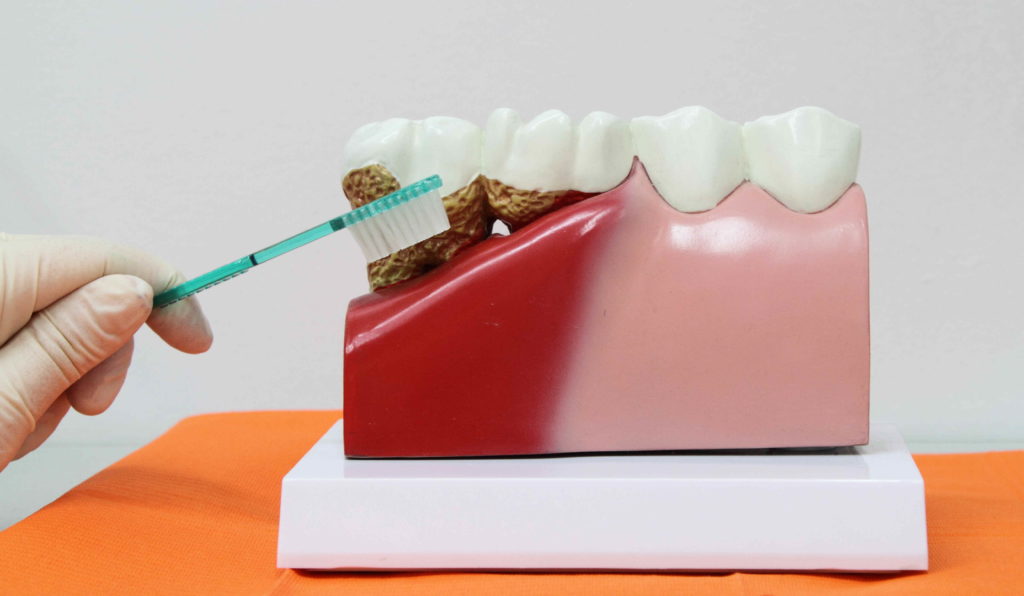Several types of pathology can occur in the oral cavity. These include gingivitis and periodontitis. The main difference between these two diseases, which affect the tissues that support the teeth, lies in their duration. Gingivitis is an inflammation of the gums. If not treated in time, it can progressively develop into periodontal disease, periodontitis. HELVIDENT explains how to differentiate between these two pathologies.
Symptoms of Gingivitis
Normally, healthy gums are firm and pale pink. If they turn red and appear irritated or swollen, you're probably suffering from gingivitis. Gingivitis is a common inflammation of the mucous membranes surrounding the teeth. It is often accompanied by bleeding during brushing and bad breath. This is the first stage of gum disease.
What causes gingivitis?
The main cause of gingivitis is dental plaque, which accumulates on tooth surfaces. This colorless, sticky film is made up of acids, sugars, bacteria and salivary proteins. If not properly removed during daily brushing, it hardens into tartar. This then attacks the gums, causing inflammation.
Nevertheless, gingivitis can appear even if you have a perfect oral hygiene. Certain factors can predispose you to gum disease. These include genetic factors linked to your family history. Certain medications and incorrectly fitted dentures can also be responsible for gum inflammation.
In addition, the pregnant women are subject to hormonal changes that favor the appearance of plaque and inflammation. There are toothpastes specially designed for use during pregnancy.
How can gum inflammation be prevented?
The dentists of our dental clinics in Lausanne, Fribourg and Aigle share their recommendations for avoiding gingivitis:
- Brush your teeth at least twice a day for at least two minutes.
- Use dental floss or an interdental brush to remove debris lodged between teeth.
- No smoking.
- Limit consumption of sugary drinks, alcohol and acidic foods.
- If necessary, use a mouthwash to treat gingivitis.
- Consult your dentist regularly.
Diagnosis of gingivitis
Suspect you may be suffering from gingivitis? Make an appointment with your dentist in Lausanne, Fribourg or Aigle. Only a doctor trained in oral care can diagnose gum disease. He will first examine your mouth thoroughly and ask you a few questions. If necessary, the professional will take an X-ray to detect any spread of inflammation to the jawbone.
In its early stages, gingivitis can be treated with homeopathy and without surgery. If periodontal disease develops, it worsens and can lead to tooth loss.
Symptoms of Periodontitis
As we explained earlier, untreated gingivitis has a high risk of developing into periodontitis. If this happens, it means that damage to the gums has reached an irreversible stage. Plaque has penetrated the periodontium, the supporting tissues of the dental organ. These include the gingiva, cementum, alveolar ligament and alveolar bone.
What causes periodontitis?
Periodontitis is a common disease, yet it can have very serious consequences. It has an infectious origin and affects one or more teeth. Here are the main factors leading to periodontitis:
- Poor oral hygiene.
- Heredity.
- Smoking.
- Weakening of the immune system.
- Untreated or poorly treated gingivitis.
- An imbalance in the oral bacterial flora.
- The existence of a systemic pathology such as diabetes or cardiovascular disease.
Periodontitis generally affects patients over the age of 35. When it progresses slowly and moderately, we speak of chronic periodontitis. Aggressive periodontitis, on the other hand, progresses rapidly and tends to affect patients under 30. In this case, there may be a genetic predisposition or a severe drop in immunity.
How to prevent inflammation of the periodontium?
To prevent gingivitis and periodontitis, the rule is the same: good oral hygiene. This means effective tooth brushing and interdental spaces, and the use of antibacterial mouthwashes.
Also bear in mind that a bleeding gums is never trivial. It's a symptom that should prompt you to make an appointment with a dentist. If you wait, you're letting the disease spread, and risking a dental emergency in Lausanne.
Diagnosis of periodontitis
As with gingivitis, only a doctor can detect periodontitis and suggest appropriate treatment. An x-ray of the oral cavity is essential to assess the extent of damage to the periodontium. Your dentist can prescribe antibiotics and specialized oral hygiene products. In cases of severe periodontitis, surgery may be considered. Finally, periodontal disease is the leading cause of adult tooth loss in Switzerland.
The HELVIDENT dental practice team includes many dentists. They include specialists in periodontics, dental implants, surgery and orthodontics. Contact us to make an appointment at our dental clinic in Fribourg, Aigle or Lausanne.

